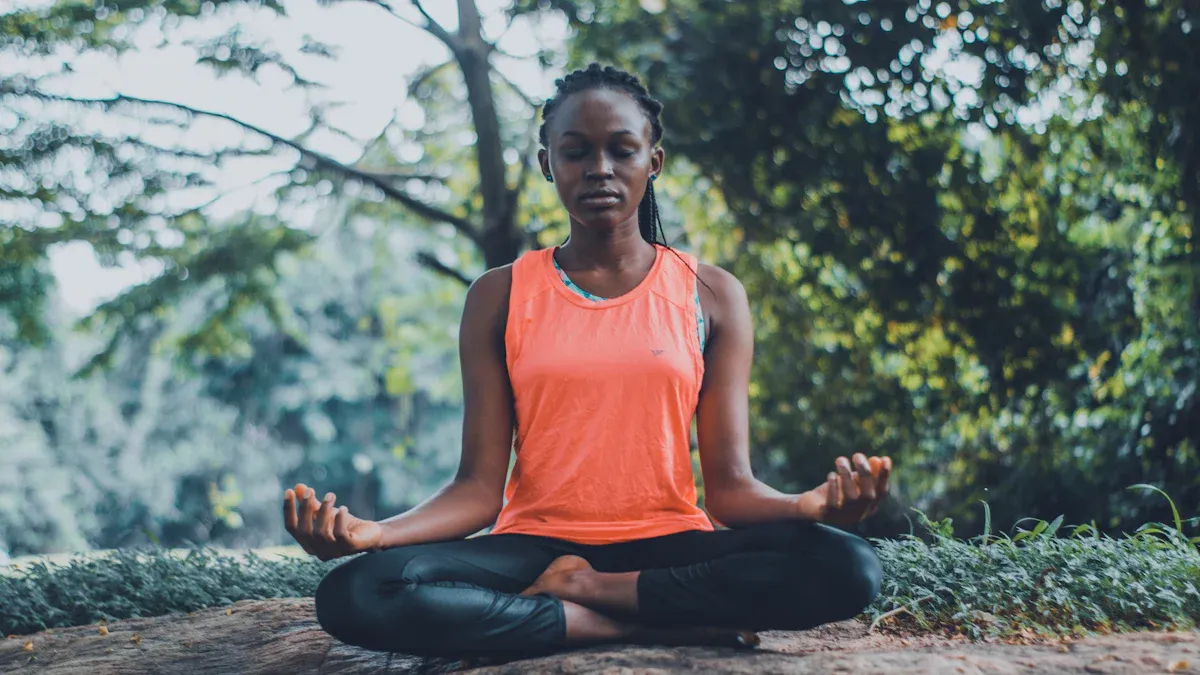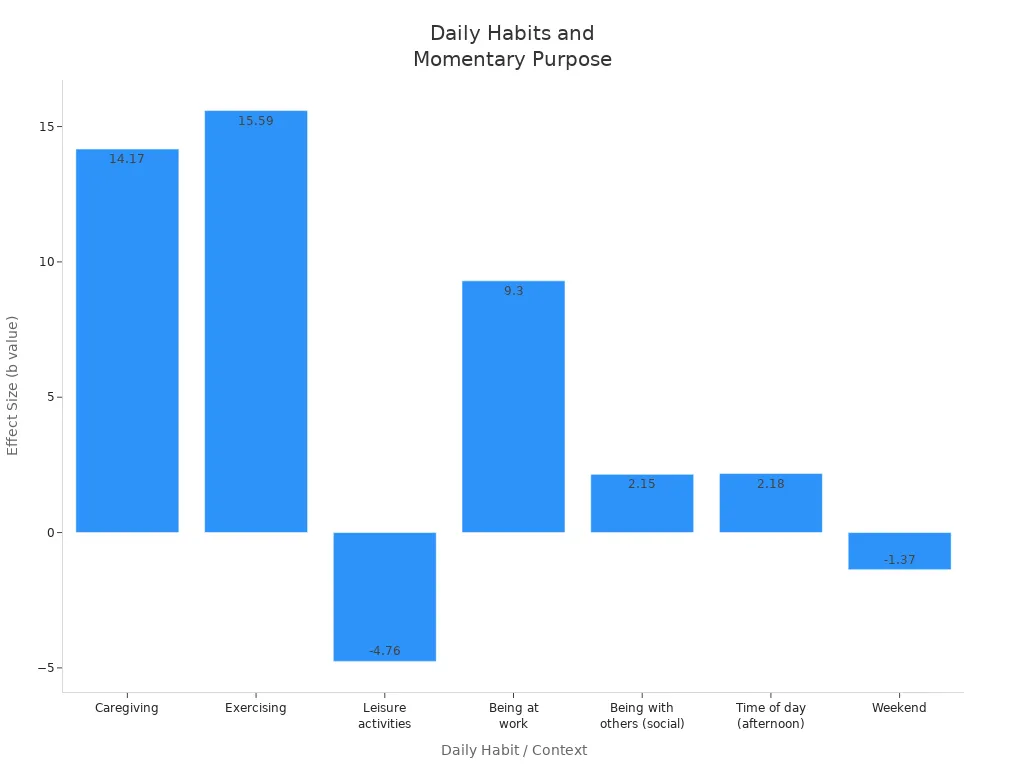Finding Your Life Purpose through Thought Exercises
Zoey
You may ask why finding your purpose matters so much. Many people feel lost or alone when life has no meaning. A Harvard survey showed that 75% of lonely adults also feel they have little or no purpose. If you want to find your life purpose, you are not the only one.
Take a deep breath and give yourself time to think. You do not have to hurry. Thought exercises can help you understand yourself better and grow.
Key Concept |
Description |
Supporting Evidence |
|---|---|---|
Personal Growth Initiative |
Setting goals and looking for ways to improve yourself. |
Studies show it helps people feel more sure of themselves and want to reach their goals. |
Impact on Sense of Purpose |
Support from others and believing in yourself help your sense of purpose. |
Research shows these things help people look forward and set better goals. |
When you open your mind and think honestly, you can find direction and feel fulfilled. Living with purpose gives you energy, confidence, and happiness each day.
Key Takeaways
Finding your life purpose helps you feel happier and more motivated. It can also make your mind and body healthier. - Get ready to think about yourself by staying calm. Try to have a positive attitude before you start. - Try easy activities like taking daily photos or writing in a journal. You can also make vision statements. These help you find out what you care about and enjoy. - If you feel unsure or worry about what others think, believe in yourself. Take small steps with confidence. - Make good habits every day and think about your actions often. This helps you live your purpose and face changes bravely.
Why Life Purpose Matters
Meaning and Fulfillment
You might wonder why people talk so much about the meaning of life. When you know your purpose in life, you feel more connected to yourself and others. You wake up with a sense of direction. Research shows that living by your values and finding meaning of life can lower depression and anxiety. People who feel a strong sense of meaning of life often report higher well-being and life satisfaction. Even during tough times, like the early days of the COVID-19 pandemic, people with a clear purpose in life felt less stress and more hope.
When you find your true purpose in life, you build a shield against negative feelings. You feel stronger and more able to handle challenges. A sense of meaning of life also helps you connect with your community, which supports your mental health.
Scientists have found that the meaning of life is not just about feeling good. It also protects your brain and body. People with a strong purpose in life have a lower risk of diseases like Alzheimer’s and stroke. Their brains even show patterns that help them handle stress better. The meaning of life can help you live longer and healthier.
Motivation and Direction
Knowing your purpose in life gives you energy. You feel excited to set goals and work toward them. People with a clear life purpose show more motivation and engagement in both personal and professional life. They feel more committed and focused.
You become more driven by your own dreams, not just what others expect.
You find it easier to stay on track, even when things get hard.
You feel more joy and pride in your achievements.
When your purpose in life matches your daily actions, you feel more alive. Leaders who help others find their true purpose in life see better teamwork and happiness at work. The meaning of life is not just a big idea—it guides your choices every day.
Prepare to Find Your Life Purpose

Set the Scene
Before you start any thought exercise, you need the right environment. Find a quiet spot where you will not be interrupted. Turn off your phone and other electronics. If you can, spend time outside in nature. The sound of birds or the feel of the breeze helps you focus and relax. Nature lets you step away from daily stress and see things more clearly. You can also bring a notebook or journal to write down your thoughts.
Tip: Try sitting under a tree or by a window. Let your senses guide you—notice what you see, hear, and feel. This helps you stay present and ready for self-reflection.
Clear Your Mind
You want your mind to feel calm before you begin. Mindfulness exercises work well for this. Here are a few you can try:
Mindfulness Bell: Listen to a bell and focus on the sound until it fades.
Candle Staring: Watch a candle flame and let your thoughts drift by.
Five Senses: Name five things you see, four you feel, three you hear, two you smell, and one you taste.
3-Minute Breathing Space: Spend one minute noticing your feelings, one minute on your breath, and one minute on your body.
These simple steps help you let go of worries. You create space to discover your purpose with a clear mind.
Mindset for Discovery
Your mindset shapes your journey. People who believe they can grow and change find more success in self-discovery. Psychologists call this a growth mindset. You see mistakes as chances to learn. You stay open to new ideas and keep going, even when things get tough. Positive thinking and patience also help you feel strong and ready for personal development. When you focus on learning, not proving yourself, you make real progress in finding your purpose.
Life Purpose Exercises

Ready to dive in? Here are five simple but powerful exercises you can try to help you discover your purpose in life. Each life purpose exercise takes just 5 to 20 minutes. You can do them in any order. Try to reflect on your values, passions, strengths, and the impact you want to make.
Daily Meaning Photos
Grab your phone or camera. For one week, take a photo each day of something that feels meaningful to you. It could be a person, a place, an object, or even a moment. At the end of each day, look at your photo and write a few sentences about why you chose it.
This practice helps you notice what matters most in your daily life.
Photo journaling, also called lifelogging, lets you see patterns in what brings you joy or makes you feel connected.
Experts say that keeping a visual record of your days increases self-awareness and helps you understand your feelings and actions better.
Journaling, even with photos, supports mental health by helping you process emotions and reflect on your experiences.
Tip: Don’t worry about taking the “perfect” photo. Focus on what feels important to you.
Vision Statement
A vision statement is a short, clear sentence about the future you want. It acts like a North Star, guiding your choices and actions. To create your own, follow these steps:
Think about your past successes. What do they have in common?
List your core values. Pick the ones that matter most.
Ask yourself how you want to help others or your community.
Set a goal for the future that matches your values and dreams.
Write a sentence that describes the life you want to live.
Step |
What to Do |
|---|---|
1 |
Remember your proudest moments. |
2 |
Choose your top values. |
3 |
Decide how you want to make a difference. |
4 |
Set a goal that excites you. |
5 |
Write your vision statement. |
A strong vision statement uses simple, emotional words. It should feel inspiring and true to you. Leadership experts say that a good vision statement is clear, hopeful, and shows what you care about most. When you read it, you should feel motivated to live with purpose in life.
Love List
Take five minutes to write down everything you love—activities, people, places, and moments that make you feel alive. Don’t hold back. Let your mind wander and fill the page.
This life purpose exercise helps you spot your core values and passions.
Psychologists say that reflecting on what you love increases feelings of control, pride, and connection.
When you know what you love, you can make choices that match your true self.
Living in line with your values leads to more happiness and less stress.
Note: Your love list can change over time. Keep adding to it as you grow.
Heartbreak Map
Think about a time when you felt deep sadness or loss. Draw or write about that experience. Where did you feel the pain? What did you learn from it? How did you grow?
Name the heartbreak.
Describe your feelings and thoughts.
Write down what you learned about yourself.
List any new strengths or values you found.
Experts say that reflecting on painful moments helps you build emotional strength and understand what matters most.
This exercise can help you see how you have changed and what you want to avoid or protect in the future.
Remember: You are not alone. Many people find their purpose in life after going through tough times.
Legacy Questions
Ask yourself big questions about your life and future. Write your answers in a journal. Here are some to get you started:
What is the hardest truth I have faced about myself?
How do I define my personal ethics?
How has my idea of happiness changed over time?
What is the most important way I have changed in the last decade?
If I could meet my future self, what would I ask?
What does success mean to me?
These questions help you think deeply about your purpose in life. Experts say that open-ended questions like these encourage you to reflect on your values, identity, and the impact you want to have. Journaling your answers can lead to greater self-awareness and help you align your actions with your true purpose in life.
Try to answer one question each day. Let your thoughts flow without judging them.
You do not have to do every life purpose exercise at once. Pick one that feels right and give it a try. Each step brings you closer to understanding your purpose in life. Remember, you create your own path by reflecting, feeling, and acting with intention.
Personalize and Overcome Barriers
Templates and Examples
You might feel lost when you try to find your purpose in life. Templates and worksheets can help you organize your thoughts and make things clearer. The Life Plan Template from Carepatron gives you a step-by-step way to reflect, set SMART goals, and focus on important areas like career, health, and relationships. This tool helps you review your progress and adjust your plans as your purpose in life grows.
Here are some popular tools you can try:
My Life Wheel: Find your true priorities and see what matters most.
Create Your Future 90-day Planner: Plan your days with vision journaling and self-checks.
Life Balance Wheel Worksheet: Look at eight parts of life, like health and work, and make action plans.
Life Audit Worksheet: Check your focus areas and set new goals.
Reflect (Autumn Edition): Use prompts to think about your skills and dreams.
Daily Intention Planner: Start each day with a clear purpose in life.
My Life Plan: Set goals in eight areas, from finances to recreation.
The One Thing Life Plan: Focus on one big goal and plan your steps.
These templates help you see your purpose in life more clearly and keep you motivated.
Overcoming Self-Doubt
Self-doubt can make you question your purpose in life. You are not alone. Many people feel this way when they start their journey. Try these steps to build confidence:
Notice your fears, but do not let them stop you.
Step out of your comfort zone to grow.
See failure as a lesson, not a defeat.
Break big goals into small steps.
Use positive self-talk and daily affirmations.
Practice mindfulness to spot negative thoughts.
Treat yourself with kindness when things go wrong.
Remember, every small win brings you closer to your purpose in life. Confidence grows as you keep moving forward.
Social Conditioning
Sometimes, you may feel pressure to follow what others expect. Family, school, and media shape your beliefs about your purpose in life. Your brain even tracks social rewards, making you want to fit in. This can make it hard to listen to your true self.
Think about this: Many people follow paths set by society without asking if they match their real purpose in life. You can break free by becoming more aware of these patterns. Ask yourself if your choices reflect your own dreams or just what others want. Over time, your brain can change and help you build a purpose in life that feels right for you. Personal development means choosing your own path, even if it feels hard at first.
You have the freedom to shape your purpose in life. Trust yourself and take small steps toward what matters most to you.
Live Your Purpose Daily
Purposeful Habits
You can bring your purpose in life into each day by making small habits. Most things you do each day are automatic. But you can choose to do things that match your goals. This helps you live with more meaning and feel closer to your purpose in life.
Here’s a simple look at how daily habits connect to feeling purposeful:
Daily Habit / Contextual Factor |
Association with Momentary Purpose |
|---|---|
Caregiving |
Strong positive association |
Exercising |
Strong positive association |
Being at work |
Positive association |
Being with others (social) |
Positive association |
Leisure activities |
Negative association |
Weekend |
Negative association |

Try to help others, move your body, or spend time with friends. These habits make you feel good and help you stay close to your purpose in life. You can also calm your feelings by taking deep breaths or thinking about problems in a new way. This keeps your mind strong and focused.
Ongoing Reflection
To keep your purpose in life clear, you need to think about it often. You can try:
Writing in a journal about your day or dreams
Meditating for a short time
Talking with someone you trust
Sitting quietly to think
Journaling is a great tool. When you write or answer questions, you notice patterns and learn about yourself. Some people read old journals to find clues about their true purpose in life. These habits help you make better choices, grow, and feel less stress. If you reflect often, your actions will match your purpose in life.
Embrace Change
Change happens to everyone. If you want to live your purpose in life, you need to accept new things and challenges. Trying new things helps you find hidden strengths and skills. You become more flexible and ready for anything.
When you face change, you learn from mistakes and become braver. Each time you try something new, you get better at handling problems and celebrating wins.
Here is a story to show this. Someone waited years to start a business because they were scared and busy. When they finally accepted change, they found meaning and did not feel regret. You can do this too by staying open, finding support, and remembering that every change is a chance to get closer to your purpose in life.
You have everything you need to start your journey. Try these exercises and trust yourself. Your purpose will grow as you reflect and adapt.
People who live with purpose enjoy better health, stronger relationships, and more happiness over time.
Mindfulness, journaling, and support from friends help you stay on track.
Living with purpose is a daily choice. Keep checking in with yourself, set new goals, and let your purpose guide you. You can shape a life that feels truly meaningful.
FAQ
How long does it take to find my life purpose?
You might find your purpose quickly, or it could take weeks or months. Everyone moves at their own pace. Stay patient and keep trying the exercises. Your purpose will become clearer as you reflect and grow.
What if I feel stuck or confused?
Feeling stuck is normal. Try a different exercise or talk with a friend. Take a break and come back later. Sometimes, new ideas pop up when you least expect them. Trust yourself and keep going.
Can my life purpose change over time?
Yes! Your purpose can shift as you learn and grow. Life brings new experiences and challenges. It’s okay to update your purpose. Check in with yourself often and let your purpose evolve.
Do I need to share my purpose with others?
You don’t have to share if you don’t want to. Some people like to talk about their purpose for support or feedback. Others keep it private. Choose what feels right for you.
What if I don’t feel passionate about anything?
That’s okay. Start by noticing small things that make you smile or feel proud. Try new activities. Over time, you’ll discover what matters most to you. Keep exploring and stay curious! 😊



